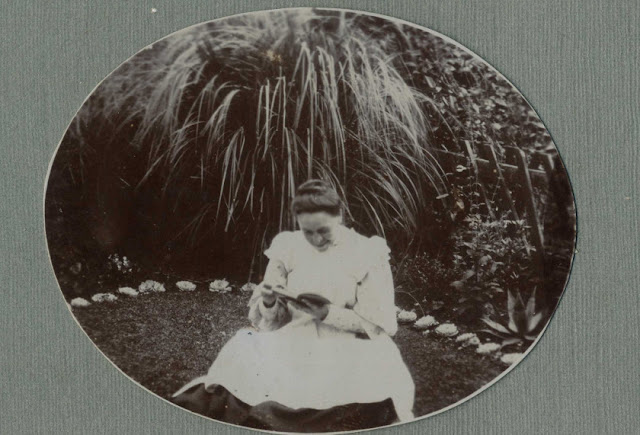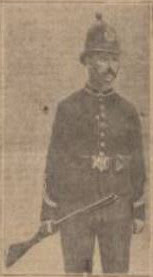Featured
- Get link
- X
- Other Apps
P.C. Beck and Family at Upwey
Grandad Beck, his wife and two children moved to Upwey, between Weymouth and Dorchester in 1903. The new house at 6 Prospect Place, a terrace of cottages was just off the main road between Dorchester and Weymouth. The unadopted dead-end lane, with the cottages on the southern side, has recently been described as 'one of the last few quaint terraced cottage streets left in Weymouth'.
 |
| P.C. No. 22 Beck (standing at back) at Portland Police Station C. 1907 by kind permission of Ian Swatridge |
Above is the earliest photograph of Grandad Beck that I have seen, he is the policeman standing at the back. This is taken from a group photograph of the sub-division of Portland, kindly given me by Dorset Police researcher, Ian Swatridge. Grandad Beck would have been about 33 years old and have been a Policeman for 12 years.
The work of a policeman required them to be out in all weathers and keeping their uniforms clean and tidy, could not have been easy. I am sure that Grandad Beck, along with other Dorset policemen appreciated the lighter more practical uniform introduced in 1907. Dust was a constant problem especially since the introduction of motor-cars. As the number and speed of cars increased, so did the problems of catching speeding drivers.
Upwey
At Lyme Regis the family lived in the police station, complete with cells and an alarm bell. The Sergeant and his family also lived there. The police cottage would have been a different experience for the whole family. While there would have still been plenty of callers, looking for the local bobby, it would have been quieter than the town station. Without the close supervision of his superior, the Upwey posting was a promotion for Grandad Beck.
 |
| Rebecca taken in the garden at Buckland Newton (see last week's post) |
In 1903 Upwey was a senior PC's posting and part of Portland Sub-Division up to 1907. A new police station and courtroom had been built on the Isle of Portland, opening in 1907. The number of policemen increased on the Isle due to the Royal Navy Base and Dockyard. Prior to this, Portland Sub-Division had held their courts in Weymouth. The town of Weymouth was a borough and had its own police force. Many of the villages parish councils including Upwey had petitioned for their police and courts to be administered by Dorchester Sub-Division. In April 1907 Upwey, with Broadwey, Abbotsbury, Bincombe, Osmington, Portesham, Poxwell and Preston were moved to Dorchester division, as requested by the residents. After Grandad Beck left, Upwey became a sergeant's posting reflecting its importance.
Dorset's Police Grey Uniforms
Dust on the unmetalled roads was a national problem, the Royal Commission considered the matter in July 1906. As reported in the Newspapers, The commission decided not to recommend an offence of the production of dust by motor-cars being driven in dusty weather at high speeds.
The effects of the dust on the roads was causing damage to policemen's blue uniforms. In 1904 Mr White said at a Standing Committee meeting that a car was going so fast, "so much dust was thrown up that nothing in the shape of letters or figures could be seen at all". Dorset Police considered this so serious that they decided to provide a lightweight grey uniform for summer wear in 1907. The Home Office did not approve and the grey uniform was discontinued in 1912.
The Problem of Checking Speeds
The speed of motor-cars was a constant problem and was discussed many times by the Standing committee. In 1903 the speed limit for cars was raised to 20 miles an hour from 14 miles per hour. But this speed was constantly broken, throughout the country including Dorset. Speedometers were not normally fitted to cars.
In July 1904 Mr White complained about the speed of cars and asked where the police were. He said he had timed a motor-car doing a mile a minute in another incident he said he had been nearly killed by a car which passed him at the speed of an express train. Another time he timed a car going over 50 miles an hour. The Chief Constable said they had 16 prosecutions in the last month, but he needed the evidence of two witnesses.
In July 1905 Chief constable asked to purchase 2 stopwatches to check the speed of cars, at present, he was hiring stopwatches. These were used on straight roads were constables can see each other, to time the cars between two points. The problem was checking the speed of cars, through towns or villages and around corners. There were a couple of apparatus available but the committee wouldn't consider them. Colonel Goodden, didn't agree that any special equipment was necessary. He considered that a policeman could roughly judge the speed, and say whether it was to the common danger. When Mr White said he had seen a driver go round a corner at quite 20 miles an hour. Colonel Goodden considered this suggestion perfectly ridiculous no car could be driven at such a rate around a corner.
All original content by Sylvia Collins is copyright protected.
References: Quotes in italics
Western Gazette: 27 February 1903 p5; Friday 22 July 1904 p9; 14 July 1905 p5; 27 July 1906 p12; Friday 04 January 1907 p5; Friday 12 April 1907 p4;
Hann, M. (2006) Bobbies on the beat, 1856-2006: 150 years of the Dorset police. United Kingdom: The Dovecote Press.
Upwey and Broadwey A Dorset Village History
http://www.upweybroadweyhistory.co.uk/otherroads.html>
- Get link
- X
- Other Apps
Popular Posts
The Wilfully and Malice Murder of Winifred Mitchell
- Get link
- X
- Other Apps


Comments
Post a Comment